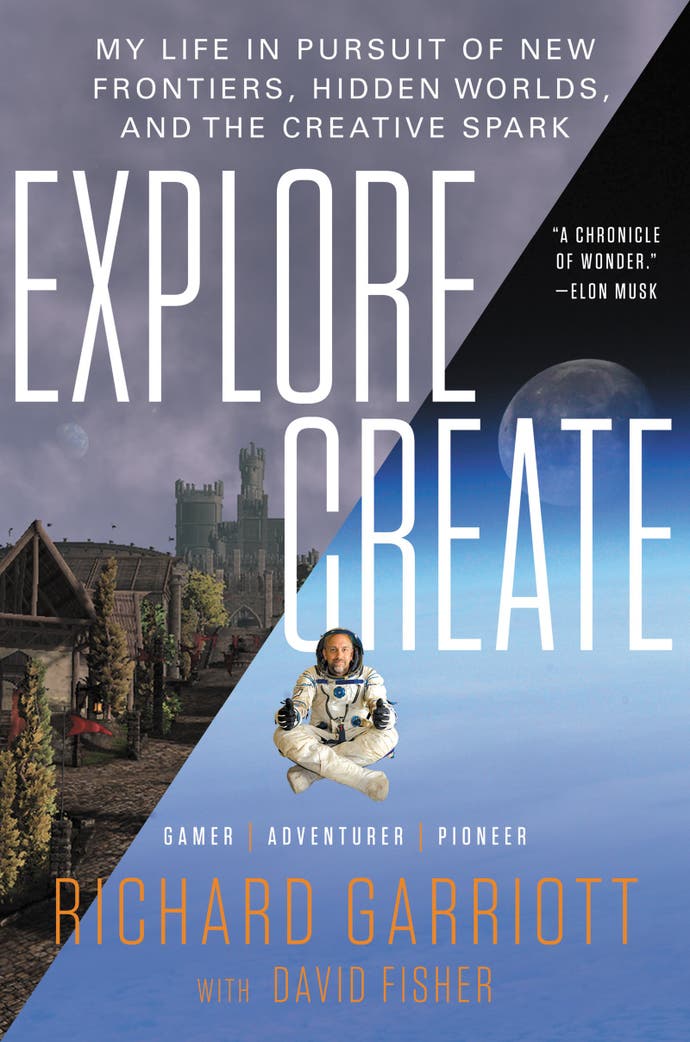How to 'toilet' in space and other lessons from a remarkable life
Inside Richard Garriott's fascinating new Explore/Create memoir
When I first spoke to Richard Garriott, the creator of Ultima, five years ago, I accused him of being weird. He had just told me he owned "a dungeon filled with macabre items" to be fair; five vampire-hunting kits, three shrunken heads, two mummies, three skeletons in coffins, human hearts and a human foetus. That's weird, isn't it? But he just laughed. "You might call it weird," he said. "I call it fascinating."
The same is true of the man himself. From afar he appears aloof, a man an income apart, made wildly rich by gaming. He built a mansion called Britannia Manor and has been to space, a trip that cost millions and millions of dollars. How can we forgive him something like Tabula Rasa when he does gaudy things like that? Up close, though, Richard Garriott is different.
His new memoir Explore/Create, out today in the US, 26th January in the UK, reintroduces him on a personal level, a human who is headstrong and bubbling with enthusiasm but as fallible as the rest of us. It explains him, what he's done and why, and doesn't pull punches about challenges faced along the way. It's fascinating, a rich compendium of stories from an extraordinary life - and my god does he have some stories to tell.

There's the time his house was broken into by a deluded fan, a fan convinced messages in Ultima games had led him there. Richard Garriott rushed to his ornamental gun collection, grabbed an Uzi, and with the go-ahead from the police fired during a confrontation on a staircase - fired into the wall, not the man. A warning shot. But the man simply shrugged, turned and disappeared somewhere else in the house. What would you do? He asks that often.
There's the time Richard Garriott was literally trapped under the Titanic, the actual immense wreckage of the Titanic, 12,600 feet under the sea in a small, three-person submarine. He thought he was done for. Or there's the time he was stuck on a rapidly drying Amazon river, surrounded by crocodiles and piranha. Or the time he found himself in boxer Jesús Chávez's corner during a WBC super featherweight title fight.
There is his long struggle to follow in his father's footsteps and go to space, albeit as a private astronaut with the Russians rather than with NASA, which tried to stop him. Makes for an intriguing perspective, involves a ceremonial wee by the roadside, phone call with Buzz Aldrin, and even describes how to defecate aboard a space station - not as simple as you may think. He'd volunteer to colonise Mars if he could, or explore the moons of Saturn and Jupiter. "And in the best of all possible scenarios," he writes, "my family would go with me."
There are his amazing haunted houses that took six months to prepare and hundreds of thousands of dollars, and hundreds of people, to pull off. They'd involve volleyball courts on fire, corridors closing in on people then pneumatically lifted and slammed into the ground, and giant Tesla coil illusions around caged visitors. "It was not at all unreasonable for the person inside that cage to think they were going to die," he writes. People wet themselves.
His parties were no less elaborate. On his return from the Titanic wreckage he threw a themed do involving an elaborate boated meal on a lake. Even the local mayor attended. You can probably guess what happened next, and I'll leave it for you to find out yourself in the book.
Yet, most pertinent are his recollections of a young self and gaming industry, where there were no visible barriers only unexplored territory. A world of cocaine-stuffed drawers and DeLoreans, a world Richard Garriott was whisked into after an unexpected windfall at a young age. He talks about struggling with money, losing friends, even coming to blows with his brother over a pencil, the final straw.
Ultima Online might have been the landmark moment in his career, and the massively-multiplayer genre, but once upon a time no one believed in it. "Multima" was bottom of the EA food chain, the team working in a hallway surrounded by polythene sheets behind which walls were being demolished. Even after attitudes changed, life wasn't rosy. He talks about how EA wanted more games more quickly, ground him down, and one day let him go. Fired from his own company; he drove to a grocery store, sat in the carpark and cried.
Tabula Rasa was ill-fated from the off. NCSoft bought it as a collaboration between East and West but both sides failed to communicate. "We should have closed down that game, accepted our losses and started over a third time from scratch with a new name," writes Garriott. Instead Tabula Rasa arrived half-baked and was closed by NCSoft before it could improve. This time, Richard Garriott was let go while in readjustment quarantine returning from 12 days in space. A letter announcing his departure and bearing his name was published to the Tabula Rasa community - a letter he knew nothing about.
Explore/Create doesn't talk about Shroud of the Avatar, Richard Garriott's new game, although in explaining his life and learnings the book naturally reveals the desire fuelling it. But I suppose Shroud is what's next, the next chapter, the answer to whether Richard Garriott still has it and can lead in an industry he helped create.
Whether he succeeds or not, he has already led a remarkable life, and Explore/Create is an unfussy, witty recollection of it, with earnest smiles in the right places, normally where mistakes were most costly. As a simple account it succeeds and entertains; here is a person whose stories you would want around a dinner table. But as a memoir of gaming it does so much more. It demystifies an industry and a man so instrumental in it, puts things in human terms - and in doing so makes so much seem possible.


